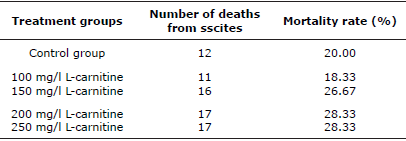INTRODUCTION
Carnitine is chemically in D- and L-form and only L-form exists in nature and is important for human and animal nutrition [1]. L-carnitine is a white, highly water-soluble powder characterized by high thermal stability (up to 200°C). Its chemical name is p-hydroxy-Y-trimethyl-amino butyrate. L-carnitine is also referred to as Vitamin BT [2]. L carnitine has an important effect on energy production and fat metabolism in the body by providing mitochondrial transport of long chain fatty acids and mitochondria removal of short and medium chain fatty acids [3]. In addition to its use in animal feeding [4], L-carnitine has also found use in a number of health sectors such as prevention of heart attacks and other heart conditions [5], hemodialysis [6] and infertility treatment [7].
Ascites (pulmonary hypertension) is a multifactorial syndrome resulted from interactions among genetic, environmental, dietary and physiological factors [8]. Ascites is a cardiovascular disorder predominantly observed in fast-growing chickens rather than in chicks. In fast-growing chickens, hypobaric hypoxia (lack of oxygen) causes right ventricular hypertrophy (abnormal enlargement) and expansion. As a result, fluid accumulates in the abdominal region death causes due to oxygen deficiency [9]. There are two hypotheses regarding the syndrome of ascites: Hypothesis 1: In the development of ascites syndrome, primary lesions occur in the lungs (pulmonary hypertension) and consequently the heart is affected (right ventricular hypertrophy). Hypothesis 2: Primary lesion in the development of ascites syndrome is caused by systemic hypertension-induced left ventricular insufficiency leading to right ventricular hypertrophy and acidosis [10]. The prevalence of ascites has been reported to increase in the recent years. Selections made to achieve faster growth in chicks have improved genetic potential, but also caused some anatomical and physiological limitations and the same improvement led to negative impacts on the health of animals. A possible deterioration in oxygen resources (altitude, ventilation) will stimulate the development of many mechanisms in the cardiopulmonary system, which will trigger ascites syndrome.
L-carnitine supplementation is considered to relate to ascites syndrome due to its effect on energy metabolism. This study aimed to investigate the effects of L-carnitine as a potential means of reducing the incidence of ascites in broilers triggered by high altitude and its relationship with physiological and biochemical paramaters.
MATERIAL AND METHODS
Animal, feeds and feeding. One-day-old 300 male broiler chicks (Ross 308) with the same body weight average were used in the trial. At the trial, animals were separated into 5 groups each of which were divided into 3 subgroups. The group without L-carnitine supplementation was the control, and the groups supplemented with 100, 150, 200 and 250 mg/l L-carnitine in drinking water were the treatment groups. L-carnitine was used in its white, pure powder form and was obtained from Vimar Food Agriculture and Livestock Industry Trade Inc. / Turkey. L-carnitine was added to the drinking water on a daily basis. The trial was carried out in November 2014 and January 2015 at altitude of 1727 meters in Van-Turkey.
Ingredients and nutrient analysis results of the feeds used in the trial are given in table 1. Broiler chicks were fed with starter feed for days 1-10, followed by grower feed for days 10-21, and finisher feed for days 21-35. A corn-soybean meal basal diet was formulated according to NRC (1994). The broilers received pellet feeds throughout the whole period. Feed and water were given freely to all groups. The trial lasted 35 days. A 24-hour lighting program was applied throughout the trial.
Table 1 Composition (g/kg) and nutrient contents (%) of mixed feeds used in the trial.
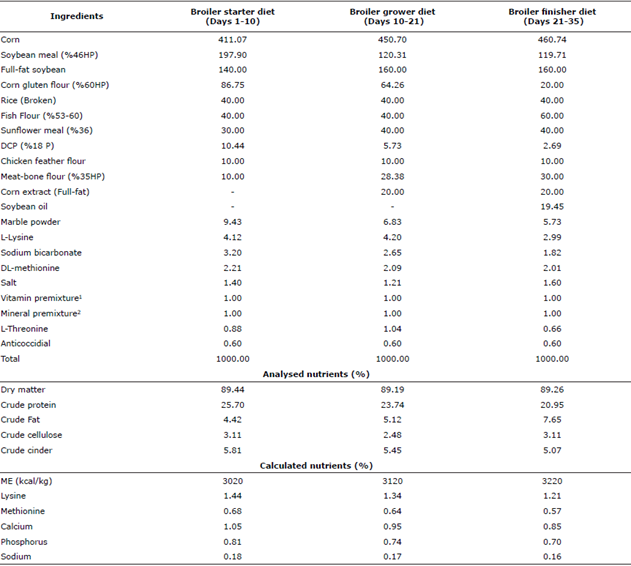
1: Per 1 kg diet: 12.500.000 IU Vitamin A, 3.500.000 IU Vitamin D3, 100.000 mg Vitamin E, 4.000 mg Vitamin K3, 3.000 mg Vitamin B1, 8.000 mg Vitamin B2, 5.000 mg Vitamin B6, 20 mg Vitamin B12, 70.000 mg Niacin, 20.000 mg Pantothenic Acid, 2.000 mg Folic Acid, 250 mg Biotin, 100.000 mg Vitamin C, 125.000 mg Antioxidant.
2: Per 1 kg diet: 120.00 mg Manganese, 40.000 mg Iron, 110.00 mg Zinc, 16.00 mg Copper, 500 mg Cobalt, 1.250 mg Iodine, 300 mg Selenium.
Blood biochemistry, mineral, hormone and blood gas values. For blood biochemical analyzes, blood samples were collected during the slaughter of 6 animals from each subgroup. Thirty minutes after collection of the blood samples, serums separated by centrifugation for 5 minutes at 4000 rpm were stored in ependorfs at -20°C until analysis. Blood biochemical analysis was performed by Swelab Alfa (Sweden) brand complete blood count device in whole blood samples. All samples were analyzed in a single study in one day. T3 and T4 hormones were detected in the plasma with Roche Diagnostic (United States) Elecsys e-411 Hormone Autoanalyzer using Roche Brand Kits. On the 35th day of trial, blood samples taken from the wing veins of 3 ascitic and 3 healthy broilers from each subgroup were collected in heparin containing syringes to avoid clot formation. Blood gas, oximetry, electrolyte and metabolite parameters were measured by Radiometer ABL-700 Blood Gas Analyser.
Statistics. Variance analysis was employed based on General Linear Model (PROC GLM) procedure in accordance with the trial design (random parcels experimental design) and Duncan's Multiple-Range Test was used to compare group averages. Statistical analyses were performed by SAS (version 9.2) statistical package software.
RESULTS
Performance parameters. Live weights of the treatment groups on weekly basis are given in table 2. When the groups were compared in terms of live weight gains, the differences between the group averages only at 7th, 14th and 28th days were found to be statistically significant (p<0.05). By 35th days, the end of trial, no significant differences were recorded between groups with respect to live weight (p>0.05).
Table 2 The effects of L-carnitine supplementation in water on performance parameters and water consumption values (ml) of broilers.
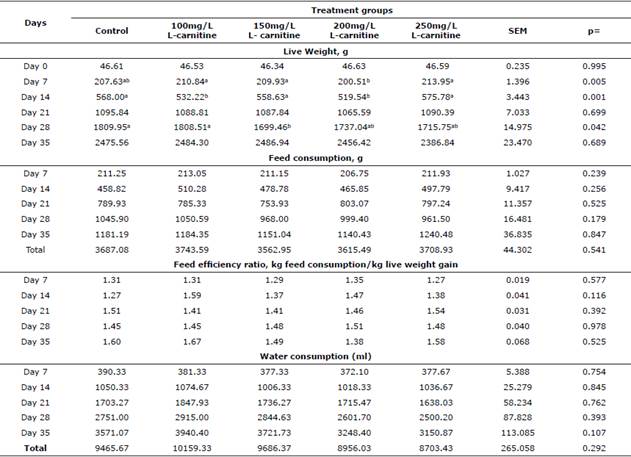
*: Differences between group averages denoted by different letters in the same row are statistically significant (p<0.05).
SEM: Standard error of difference between means.
L-carnitine supplementation in water did not have any significant effects on cumulative feed consumption of broilers by weeks and at the end of the trial (p>0.05). However, at the end of the trial, the highest amount of feed consumption was observed in the group receiving 100 mg/l L-carnitine, while the lowest was observed in the group receiving 150 mg/l L-carnitine.
As seen in table 2, no significant differences were detected in feed conversion ratios between groups throughout the trial (p>0.05). However, in the group receiving 200 mg/l L-carnitine supplementation, the feed efficiency ratio improved (1.38) numerically.
As indicated by table 2, no significant differences were recorded in water consumption values between groups throughout the trial (p>0.05). On the other hand, though not statistically significant, total water intake was higher in the group supplemented with 100 mg/ l L-carnitine compared to the other groups by the end of the trial.
Mortality rates. The effects of L-carnitine supplementation on mortality rates of broilers are presented in table 3.
The lowest mortality rate (18.33%) was recorded in the group supplemented with 100 mg/l L-carnitine while the highest mortality rate (28.33%) was recorded in the groups supplemented with 200 and 250 mg/l L-carnitine.
Blood plasma and hemogram parameters. The effects of L-carnitine supplementation in water on selected blood plasma and hemogram parameters are shown in table 4. By the end of the trial, L-carnitine supplementation did not result in any significant differences between groups in blood plasma parameters Aspartate aminotransferase (AST), Alanine aminotransferase (ALT), Alkaline phosphatase (ALP), total protein, cholesterol, Low density lipoproteins (LDL), Triiodothyronine (T3) concentration and hemogram parameters Mean corpuscular volume (MCV), Red cell distribution width (RDW), Red cell distribution with actually (RDWa), hematocrit, platelet, hemoglobin concentrations (p>0.05). On the other hand, significant differences were recorded in High density lipoproteins (HDL), triglyceride, creatine kinase, glucose, Thyroxine (T4), Red blood cell count (RBC), Mean corpuscular hemoglobin (MCH) and Mean corpuscular hemoglobin concentration (MCHc) values between groups (p<0.05).
Blood gas parameters. Blood gas, oximetry, electrolyte and metabolite were measured in the blood samples taken from 3 ascitic broilers and 3 healthy broilers from each subgroup. The effects of L-carnitine supplementation on blood gas paramaters of ascitic and healthy broilers are presented in table 5. L-carnitine supplementation in water did not have any significant effects on hematocrit, Sodium (Na), Potassium (K), Calcium (Ca), Plasma bicarbonate (HCO3 p), Standart bicarbonate (HCO3 pst), Base excess (C Base B) blood gas, electrolyte and metabolite values of ascitic and healthy broilers (p>0.05). On the other hand, Pouvoir hydrogen (pH), Partial pressure of carbon dioxide (pCO2), Partial pressure of oxygen (pO2), Chlorine (Cl), Hemoglobin (Hb), Breathe carbon dioxide concentration (ctCO2B), Partial pressure of carbon dioxide concentration (ctCO2P), Anion K, Anion Gap, Oxygen saturation (SO2) and Oxygen content (ctO2) values were significantly affected by treatments (p<0.05). Blood pH value significantly decreased in ascitic broilers compared to healthy broilers.
Table 4 The effects of L-carnitine supplementation in water on selected blood plasma and hemogram parameters of broilers.
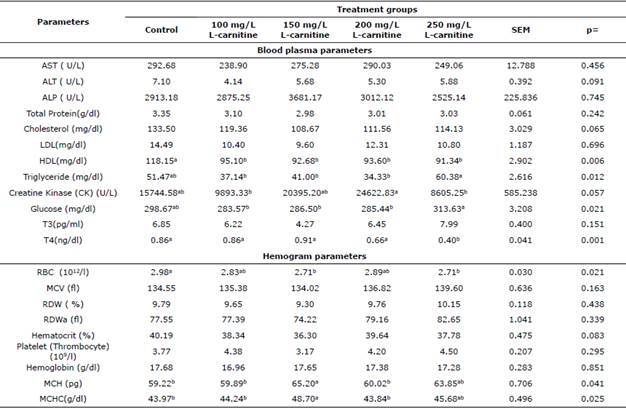
*: Differences between group averages denoted by different small letters in the same row are statistically significant (p<0.05).
SEM: Standard error of difference between means.
Table 5 The effects of L-carnitine supplementation in water on blood gas paramaters of ascitic and healthy broilers.
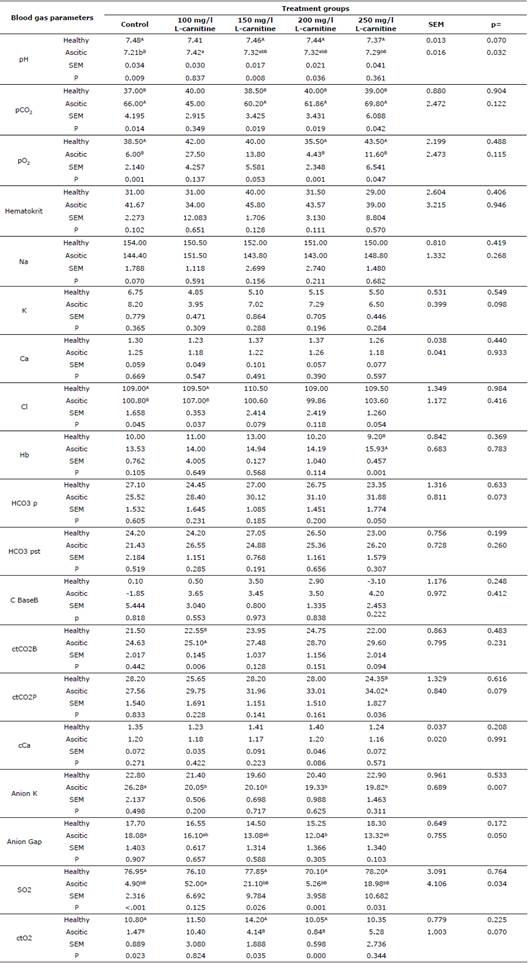
*: Differences between group averages denoted by different small letters in the same row are statistically significant (p<0.05).
**: Differences between group averages denoted by different capital letters in the same column are statistically significant (p<0.05).
SEM: Standard error of difference between means.
DICUSSION
Similar to our live weight findings, 100 mg/kgL-carnitine supplementation to broiler rations with different energy levels [11]; 900 mg/kg L-carnitine supplementation to 5% animal fat containing broiler rations [4]; and 400, 600 and 800 mg/kg liquid and power L-carnitine supplementation to broiler rations [12] has been reported that L-carnitine additive has no significant effect on live weight gain at the end of the trial (p<0.05). Contrary to current research, there are studies reporting that L-carnitine contributes significantly to live weight gain. Parsaeimehr et al [13] reported that the addition of 300 mg/kg L-carnitine to rations containing different levels of animal fat significantly improved live weight gain. Jalali et al [14] reported significant increases in live weight at the end of the 35-day trial of L-carnitine addition (120 mg/kg) to rations containing soybean oil and sunflower oil. The differences observed among these research findings may be attributed to differences in rations, dose levels used, and combinations of other additives used along with L-carnitine supplementation. In summary, the fact that there is no statistical difference between the groups as revealed by the live weight data obtained at the end of the trial indicates that the doses of the L-carnitine supplementations used are not in the concentrations that will change the live weight value positively or negatively.
Murali et al [4] and Corduk et al [11] reported that L-carnitine supplementation in broiler rations had no significant effect on feed consumption The results of these researchers are in line with our findings indicating that addition of different levels of L-carnitine in drinking water does not significantly affect feed consumption of broilers. On the other hand, there are also studies showing that L-carnitine supplement significantly affects feed consumption. Wang et al [15] reported that L-carnitine (100 mg/kg) supplement significantly reduced feed consumption in broilers raised at low ambient temperatures. Such differences between researches findings can be attributed to the dose levels of the L-carnitine supplement used, the ration energy levels and the animal species used. The fact that there is no statistical difference between the groups referred from the feed intake values obtained at the end of the study indicates that the L-carnitine dose levels used do not have a significant effect on appetite in broilers.
Murali et al [4]; Taklimi et al [12] and Wang et al [15] reported that L-carnitine supplement had no significant effect on feed efficiency ratio in broilers. Likewise, Geng et al [16] conducted a study to determine the effects of L-carnitine and coenzyme Q10 additives on the immune system and growth performance of the broilers against ascites. L-carnitine was used at doses of 0, 75 and 100 mg/kg and coenzyme Q10 was used at doses of 0 and 40 mg/kg, respectively. As a result of the trial, the feed efficiency ratio in the group supplemented only with L-carnitine improved numerically. Michalczuk et al [17] reported that L-carnitine supplemented with drinking water (62.5 g/100 liters) improves the feed efficiency ratio numerically. The findings of these researchers are in agreement with the findings of this study. This consistency can be attributed to the fact that the levels of L-carnitine additives used do not affect feed consumption. Contrary to these findings, studies have shown that L-carnitine significantly contributes to the feed efficiency ratio. Sharifi et al [18] found that L-carnitine supplement (100 mg/kg) with reduced protein (3%) significantly improved feed efficiency. The differences observed between these research findings can be attributed to the differences in animal species and ration used.
Total water intake was numerically higher in the group supplemented with 100 mg/ L L-carnitine compared to the other groups by the end of the trial. This can be attributed to the fact that the group receiving 100 mg/l L-carnitine supplementation consumed higher amount of feed compared to the other groups. Although no statistically significant difference was found between the groups in terms of water consumption, it was noticed that water consumption decreased numerically with increasing levels of L-carnitine supplementation. This conclusion suggests that broilers will be of high importance in determining L-carnitine requirements.
In the current study, mortality rate in the group receiving 100 mg/l L-carnitine supplementation was found to be lower than that of the control group. The increase in ascites mortality rates in the 5th week towards the end of the trial can be attributed to the increased oxygen demand due to the increased live weights of the animals and the inability to meet them adequately, as well as the use of feed in pellet form. Zohair et al [19] reported that compared to powder feed, pellet feed triggers ascites in broilers raised at high altitudes. Ascites death rate in the current study is lower. This can be attributed to the fact that the animals were not subjected to cold stress, which triggers the ascites. In contrast to the present study, the rate of death due to ascites was identified as 3.75% for the group grown in normal temperature conditions; 12.5% for the cold stress group and 8.75% for the group exposed to cold stress and received L-carnitine (100 mg/kg) in the study conducted by Tan et al [20]. These ascites death rates are lower than those obtained in the current trial.
Çördük et al [11] reported that L-carnitine supplementation in broiler rations did not significantly affect blood glucose, cholesterol and triglyceride levels. Likewise, total cholesterol, LDL and triglyceride levels [21]; hemoglobin and MCV levels [22]; serum cholesterol and LDL levels [23]; blood glucose, LDL, cholesterol, triglyceride, and total protein levels [13] and serum hematocrit value [18] were not significantly affected by L-carnitine additive in broiler rations. These results are consistent with the findings of the present study.
Contrary to existing findings, Çördük et al [11] reported a significant increase in AST levels of broilers fed with high-energy rations. Simgek et al [24] reported that WBC, RBC, hemoglobin and hematocrit values were higher in L-carnitine supplemented rats. Elgazzar et al [25] revealed that L-carnitine supplementation significantly reduced cholesterol, triglyceride, LDL, AST, ALT and ALP levels in New Zealand rabbits. Jali et al [14] found that L-carnitine supplement to rations containing soybean oil and sunflower oil significantly reduced triglyceride levels while significantly increasing blood total protein, cholesterol, HDL and LDL levels. The differences between these findings can be attributed to differences in the energy levels of the rations used, energy sources and animal material.
Geng et al [16] and Yousefi et al [26] reported that L-carnitine supplement significantly reduced the hematocrit value in broilers. In the current study, with L-carnitine supplement, the blood hematocrit value tended to decrease numerically though not statistically. The thyroid gland hormones (T3, T4) are directly related to the development of the animals as they increase the basal metabolism. When the thyroid gland is running poorly, there is a slow-down in the development of the animals due to the disorder that occurs in the basal metabolism [27]. In the present study, plasma T4 levels were significantly reduced with high doses of L-carnitine supplement (250 mg/L). This may be related to the fact that the live weight gain is also found to be the lowest in this group.
While blood pH value was measured as 7.21 in ascitic broilers, it was measured as 7.48 in healthy broilers. Low dose of L-carnitine supplementation (200 mg/l) was observed to increase blood pH value in ascitic broilers (p<0.05). As expected, the pCO2 value was found higher in ascitic animals compared to healthy animals, while the pO2 value was found to be lower. However, these values were not resulted by statistically significant effects of L-carnitine supplementation. The lowest pCO2 value for healthy animals was found to be 37.00 and the highest value for ascitic animals was 69.80. The highest pO2 value for the healthy animals was 43.50 and the lowest value for the ascitic animals was 4.43. Van As et al [28] reported that while pCO2 levels were significantly increased in ascites, pO2 levels were significantly reduced. Hafshejani et al [29] reported a significant decrease in pH value in ascitic animals. The findings of these researchers are consistent with the findings of the present study. Although chlorine concentration value was not significant for all groups among all healthy and ascitic animals, it was statistically significant in control and the group receiving 100 mg/l L-carnitine supplementation. There was no statistical difference between the other treatment groups which can be attributed to the large intra-group variance. Concentrations of SO2 and ctO2 were higher in healthy animals, while ctCO2P and hemoglobin concentrations were higher in ascitic animals (p<0.05). Blood hematocrit value was also increased numerically in ascitic animals. These results are in agreement with the findings of Tekeli [30]. In broilers at high altitudes, SO2 and FO2Hb decrease oxygen saturation in blood and increase cTHb and Hctc (hematocrit) values, leading to ascites.
In conclusion, blood pH value significantly decreased in ascitic broilers compared to healthy broilers. L-carnitine supplementation was found to be beneficial in decreasing ascites (pulmonary hypertension) mortality rates. These positive effects can be achieved by using low doses of L-carnitine supplements. It is expected that L-carnitine supplementation in water of broilers which are fed on diets with lowered energy and protein contents can be more effective in reducing ascites mortality rates. More research is needed to confirm these benefits.











 texto em
texto em 

